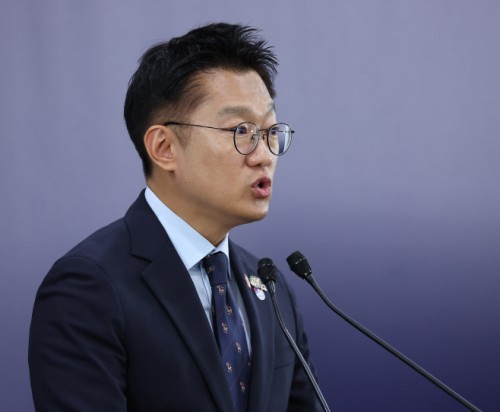 |
| Presidential spokesperson Kim Nam-joon briefs reporters on the South Korea–Canada summit at the APEC Media Center in Gyeongju on October 30. / Source: Yonhap News |
President Lee Jae-myung on November 3 issued an emergency directive to immediately suspend all government asset sales, following mounting criticism over alleged “fire-sale” disposals of state-owned property.
In a written briefing, presidential spokesperson Kim Nam-joon said, “Concerns have been raised in the National Assembly and the media that state assets are being sold at below-market prices. Accordingly, President Lee has urgently ordered all ministries and public institutions to halt the sale of government assets.” Kim added that relevant ministries have been instructed to “swiftly verify the facts surrounding the alleged undervalued transactions and devise institutional reforms.”
Government spokesperson and Culture Minister Choi Hwi-young also relayed the president’s instructions in a separate press release, noting that Lee ordered even ongoing sales to be reviewed before any final decisions are made. The president further directed that, aside from truly unnecessary assets, sales should be avoided, and any essential transactions must receive prior approval from the prime minister.
Lee’s emergency order appears to respond to allegations raised during a recent parliamentary audit that state assets were sold off cheaply under the previous Yoon Suk Yeol administration. On October 23, lawmakers criticized the Korea Asset Management Corporation (KAMCO), the Korea Housing Finance Corporation, and the Korea Credit Guarantee Fund for approving asset sales at abnormally low prices.
During the audit, Democratic Party lawmaker Kim Seung-won pointed out that “the Yoon administration announced plans in August 2022 to sell over 16 trillion won worth of low-utilization state assets within five years. While under previous governments only around 10% of sales closed below the appraisal price, the rate under Yoon surged to 42%, 58%, and 51% in successive years.” His colleague, Rep. Park Beom-gye, added, “The biggest issue is that the bid-to-appraisal ratio has dropped to 73%, meaning assets were sold at steep discounts — and that someone or some group gained a 27% profit margin in the process.”
Most Read
-
1
-
2
-
3
-
4
-
5
-
6
-
7





















